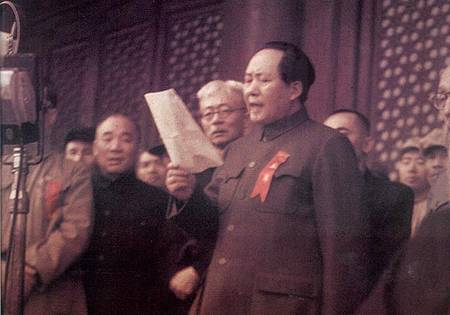1949
2021-04-22 16:48:55
October 1, 1949

The Central People's Government of the People's Republic of China was established.
Previously from September 21 to 30, the 1st Plenary Session of the Chinese People's Political Consultative Conference (CPPCC) was held, at which the Common Program of the Chinese People's Political Consultative Conference, an interim constitution, was adopted. The Common Program stipulated that the state system of the People's Republic of China (PRC) was the people's democratic dictatorship led by the working class on the foundation of the alliance of workers and farmers, and its system of government was a people's congress system characterized by democratic centralism. The Session also passed the Organization Law of the Chinese People's Political Consultative Conference and the Organization Law of the Central People's Government of the People's Republic of China. The Session decided that the PRC's capital was Beijing, which was to be renamed from Peiping; China's official calendar was to follow the AD system; the “March of the Volunteers" was to serve as the interim national anthem; and the Five-Starred Red Flag was to be the national flag, The Session elected Mao Zedong chairman of the Central People's Government, Zhu De, Liu Shaoqi, Soong Ching Ling, Li Jishen, Zhang Lan and Gao Gang vice-chairmen, and Chen Yi and 55 other members of the Central People's Government Committee. At 2 pm on October 1, the Central People's Government Committee held its first meeting and unanimously decided to accept the Common Program as the administrative policy of the government, and appointed Zhou Enlai as premier of the Administrative Council of the Central People's Government, Mao Zedong as chairman of the People's Revolutionary Military Commission and Zhu De as commander- in-chief of the People's Liberation Army. At 3 pm, a ceremony was solemnly held at the Tiananmen Square, Beijing to celebrate the founding of the Central People's Government of the People's Republic of China. Mao Zedong proclaimed the establishment of the Central People's Government, followed by a grand military parade and a mass parade. On December 2, the 4th Meeting of the Central People's Government Committee was held, which decided that October 1 of each year was to be the national day of the People's Republic of China. The founding of the People's Republic of China in 1949 marked China's great leap from its millenia-old feudal autocracy to democracy of the people, a milestone of the great rejuvenation of the Chinese nation since modern times. At that moment, the Chinese nation ushered in a new era of development and progress.
